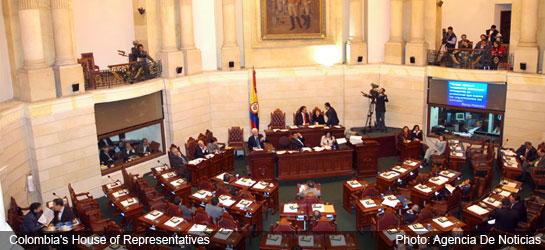
A national constituent assembly to amend Colombia’s constitution as proposed by supporters of ex-President Alvaro Uribe is “very unlikely” to materialize, a leading political scientist said Friday.
Edgar Ramirez, political science professor of the National University in Medellin, told Colombia Reports that the possibility of a national constituent assembly is “very unlikely because the political forces support Santos and the majority of congress do not approve of the measure.”
The Uribista propositions and motivations behind the proposed national constituent assembly have so far been unclear.
According to Luis Carlos Restrepo, Uribe’s fugitive former peace commissioner, the constituent assembly must secure, “among other things, a justice reform to give legal guarantees to the members of the security forces, and make an end to the pension carrousel and the corruption in tribunals and courts.”
However, Ramirez believes allies of the former president are exploring the possibility of amending the constitution so as to allow the influential Uribe a third tilt at the presidency. A controversial bill approved by Congress to change the constitution and allow presidents to run for a third turn was deemed unconstitutional by the Constitutional Court in 2010 after a series of corruption, legislative and financial malfeasance scandals in the process leading up to the final vote.
On July 20, President Juan Manuel Santos dismissed attempts to change the constitution via a national constituent assembly or referendum as, “inconvenient and dangerous (…) we know where they start but not where they end.”
The convocation of a national constituent assembly to alter the constitution would be a rare and momentous event in Colombia’s recent history. A constituent assembly in 2012 has not been convoked since 1991, when Colombia’s current constitution was passed.
A national constituent assembly is one of only three mechanisms to change Colombia’s constitution. The two alternatives are a vote in congress or a referendum.
The process of convening an assembly is complex and protracted. Even if the idea received widespread support, a decision by an assembly would likely not be reached until 2013, claimed Ramirez.
First, a majority of members in the House of Representatives and the Senate must approve the call to gather the assembly. They are also responsible for confirming the agenda and membership of the assembly.
Once a number of committee members have been determined by congress, an election is called where voters choose the candidates they wish to represent them in the assembly. In 1991, the assembly was made up of luminaries from the major political parties, recently demobilized guerrillas and other community leaders. According to Ramirez, approximately 100 members would be the likely figure.
A majority decision of the assembly must be reached before an amendment can be made. It is possible that the assembly would approve only part of the proposals put forward.
The former head of state has been one of the most vocal critics of the sitting president since the 2010 election. Uribe enjoyed record high approval ratings during his eight years as president and remains an influential and popular figure in Colombia.

